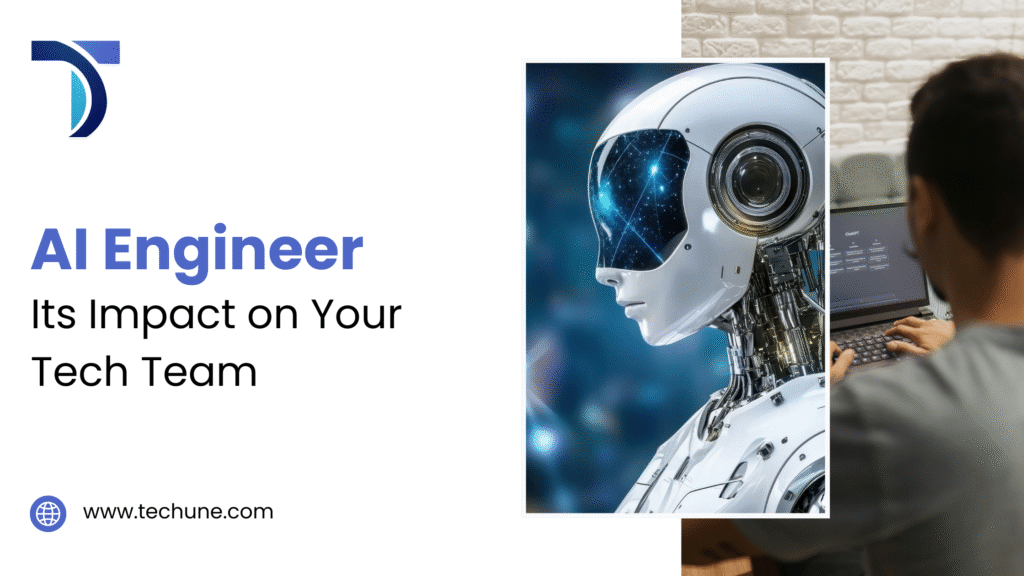
Concerning VPs of Engineering and CTOs, the term ‘AI Engineer’ might seem like a buzzword to include in job descriptions, and if you are hiring, in discussions as well. Still, is it a newly created function, or is it a mere rebranding of old skills that were spread across other technology positions? The fact is, there is no standard definition, and you are unlikely to hear “AI Engineer” with a single definition.
In essence, it is a term that encompasses a range of skills relevant to implementing AI in a business setting. To consider the strategic impact of this position, think about how it both replaces and enhances the traditional roles of an engineer and a data worker.
From Classic Roles to Modern Needs
The technical environment has consistently been characterised by specialised roles defined by specific responsibilities. Undeniably, before the generative AI hype, teams were organised around:
- The Data Engineer: The data infrastructure architect. They build and manage the data pipes, ensuring data is clean, structured, and secure. Their arsenal includes platforms like Snowflake, BigQuery, and Airbyte.
- The Business Intelligence (BI) Analyst / Engineer: The report and dashboard experts. They focus on transforming scattered raw data and information into actionable business intelligence using tools like Power BI, Tableau, and others.
- The Data Scientist: The data analyst and data statistician. They specialize in digging deep into the data to generate insights and build foresight models.
- The Machine Learning (ML) Engineer: The model creator. They use TensorFlow and PyTorch to train, evaluate, and optimize complex machine learning and deep learning models.
The development of generative AI systems that can write, design, automate, or even interpret requires a different set of skills. There is a great need for practitioners who can connect data, machine learning teams, and end-user applications and who can transform theoretical ideas into tangible solutions.
Matching Skills for Business Application: A Strategy Model
Techno-savvy people know which set of capabilities is most critical for a specific product in its proper function.
Creating a Simple MVP or a SaaS Product
Business Problem: We need to move quickly and ship a brand-new app with a built-in aspect of artificial intelligence within a short period to gain early customers and prove out market fit. Speed to market is king.
Recommended Role: The Coding AI Engineer. He or she is a typical software engineer proficient in incorporating AI within programs. He or she is responsible for ensuring the product works as intended with the AI models and services, securely, and in large quantities.
A Retail Business with Large Data Sets
Business Problem: Extracting meaningful information out of a vast and sophisticated information environment (Data Warehouse, Data Lakes) in favor of decision support.
Organizational Readiness: If a company has mountains of data, but it is dirty or scattered across several systems, the first step is to bring in a Data Engineer. The Data Engineer will structure and lock down this data. Once data is structured, a Data Scientist can be brought in to scan and model it. After these foundation pieces are addressed, you can release the power of AI applications.
Recommended Profile (Post-Readiness): The Business Intelligence AI Engineer. This is the person responsible for converting business insight into intelligence. He/she is an expert at utilizing AI software to analyze big data sets and leveraging AI-powered BI platforms (such as Power BI, Tableau) to enable leaders to make decisions.
Processing Business Documents and Creating a Customer Support Chatbot
Business Challenge: Automate document processing and create a conversational customer service experience. A product foundation is rooted in efficiently harnessing a large-scale language model.
Recommended Persona: The Prompt Engineer. He is skilled at taking advantage of LLMs like GPT, Claude, or Llama. He can author workflows where knowledge assistants or chatbots are augmented with generative AI.
Why is That Convergence Useful for Your Business?
Startups, along with large companies, are adopting AI Engineers because it keeps businesses ahead in the competition..
- Speed to Market: Consumers anticipate smarter applications today.
- Cost Optimization: Cloud spending can get out of hand, yet AI Engineers contain it.
- Tangible Value: No longer are companies receiving experiments continuously, but rather actual solutions they can use daily.
Closing Comment: A New Era in Engineering
The phrase is “AI Engineer,” today’s buzzword perhaps, but whose value is real. It is a signal towards less expertise-siloing, developing and delivering technology, but rather a multi-disciplinary results-oriented method. There is no such “superhuman role” in becoming an “AI Engineer,” but rather it is all about blending a range of skills in the right way to produce results.
From “What does an AI Engineer do?” to “Is your company ready to take advantage of the maximum value you can provide?”
Are you ready for more intelligent product design? Contact us today to hear about how you can enable your team to design intelligent solutions with real business value.